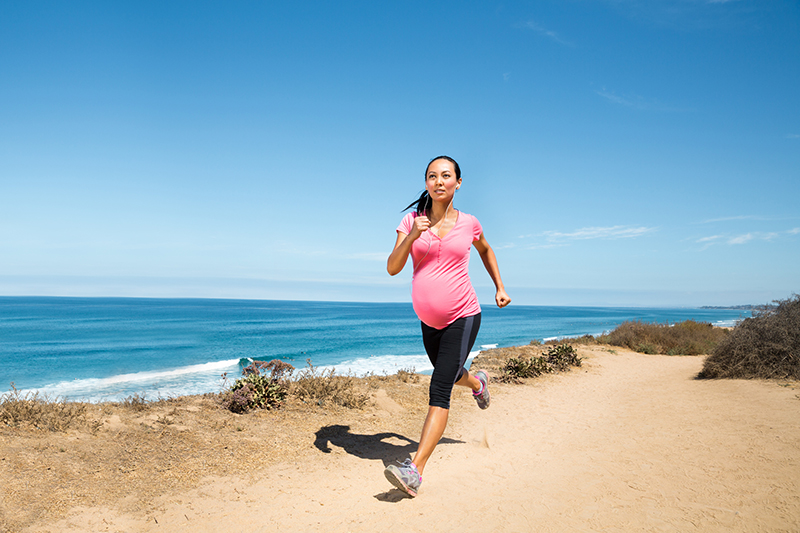Families For Life | Being Fit when Pregnant

Keeping active during pregnancy is good for you and your baby.
Pregnancy exercises
Getting pregnant does not mean you should cease all physical activity. In fact, keeping fit during pregnancy improves your stamina and helps you maintain strength and endurance. It helps you cope and may even shorten your labour. More importantly, it helps you get back in shape after your delivery.
It is advisable to check with your doctor before you start an exercise regime, especially when you have any medical condition (e.g. serious heart disease, high blood pressure etc) or have some problems in your past or current pregnancy.
Suitable exercises and sports throughout pregnancy
You can continue your normal daily physical activity such as walking for as long as you feel comfortable. If you are in a gym or exercise class, do let your instructor know that you are pregnant. If you are not normally active, do not start strenuous exercises suddenly. You can start slowly with as little as five minutes of physical activity and increase the intensity and duration as your stamina increases.
Moderate physical activity is recommended on most, if not all days of the week. It is important not to over exert yourself. As a general rule, you should be able to carry on a conversation while exercising.
For normal pregnancies, the following exercises and sports are suitable throughout the pregnancy. As the pregnancy progresses, you may have to reduce the intensity.
Brisk walking (outdoor or treadmill)
Swimming
Cycling (stationary) – a recumbent bike with back support may be more comfortable
Working out using cross training machines
Non-contact sports that do not involve the possibility of contact with another player or falling, e.g. golf, bowling
If you cannot fit an exercise routine into your schedule, you can increase physical activity by using the stairs instead of the lift. If you take public transport, consider getting off the bus one stop earlier and walk home. Even a walk after dinner will do you good.
Pelvic floor exercise
The pelvic floor muscles support the bowel, bladder, womb and vagina. Pregnancy and childbirth can stress the pelvic floor muscles and cause leaking of urine when you sneeze, cough or strain (also known as stress incontinence ) during pregnancy which may persist later in life. Strengthening the pelvic floor muscles will reduce this risk. It should start during pregnancy and continue even after delivery.
Imagine trying to hold or stop urinating by squeezing the lowest muscles of your pelvis. Try to hold the squeeze for 5-10 seconds and release slowly. Relax your abdominal muscles while doing it and do not hold your breath. Alternatively, perform short and hard squeezes and repeat 10 times. This exercise can be performed lying down, sitting or standing.
Sports to avoid during pregnancy
Be sensible when you exercise during pregnancy because it can have an impact on the foetus.
Avoid sports or exercises that put you at risk of:
being hit, such as contact sports like judo, kickboxing
falling, such as horse riding, cycling outdoor
decompression sickness, such as scuba diving
altitude sickness from the decreased oxygen, such as exercising in high altitude before acclimatisation
feeling faint, such as lying flat on your back after 16 weeks of pregnancy. The weight of the womb and baby can compress the big blood vessel located at the back.
Stop exercising and see your doctor if you feel unwell or have any concerns about your foetal well-being. Some of these symptoms include:
vaginal bleeding
decreased baby movements
fluid leaking from the vagina
painful womb contractions
chest pain or irregular/rapid heartbeat (palpitation)
dizziness
shortness of breath
headache
calf pain/swelling
excessive fatigue.
How to exercise safely during pregnancy
Trimester | Changes in your body | Things to note during exercise | Safety measures |
Throughout pregnancy | Heart rate, metabolic rate and body temperature increase. | Baby gets oxygen and nutrients for growth and development via the placenta. | Exercise increases blood flow to the working muscles, which may compromise blood flow to the placenta for baby's use. Be careful not to over-exercise as this may cause your body to overheat and may result in organ malformation in baby. This is not the time to train or participate in competitive sports or to beat your personal best. Heart rate is a poor indicator of exercise intensity during pregnancy. |
1st (week 1-12) | Breast soreness, fatigue, morning sickness. | If you often vomit or have poor fluid intake, you will dehydrate and this may increase the risk of overheating, resulting in organ malformation in the baby. | Always drink lots of fluids and keep your body cool. If you are not well, do not exercise. |
2nd (week 13-28) | Appetite returns, weight increases, breasts and womb start to enlarge. | This is a good time to begin or carry on with your exercise regimen as risks and discomfort of pregnancy are at their lowest. | Once past your fourth month, do not work out while lying on your back. The weight of the womb may interfere with blood circulation. |
3rd | Your enlarging womb will press against the rib cage causing shortness of breath. Hormonal changes result in loose joints and you may experience lower abdominal and back discomfort. Increased pressure on bladder causes frequent urination. | You will feel more tired and may use up more energy during exercise. Risk of falls, injury on lower back, pelvis, joints and muscles increase. Possible urine leakage during exercise. | Expect a decline in overall activity and fitness level at this point. Reduce exercise volume and intensity if you feel tired or uncomfortable.
|
Explore more
Contributed by:
Health Promotion Board's Parent Hub